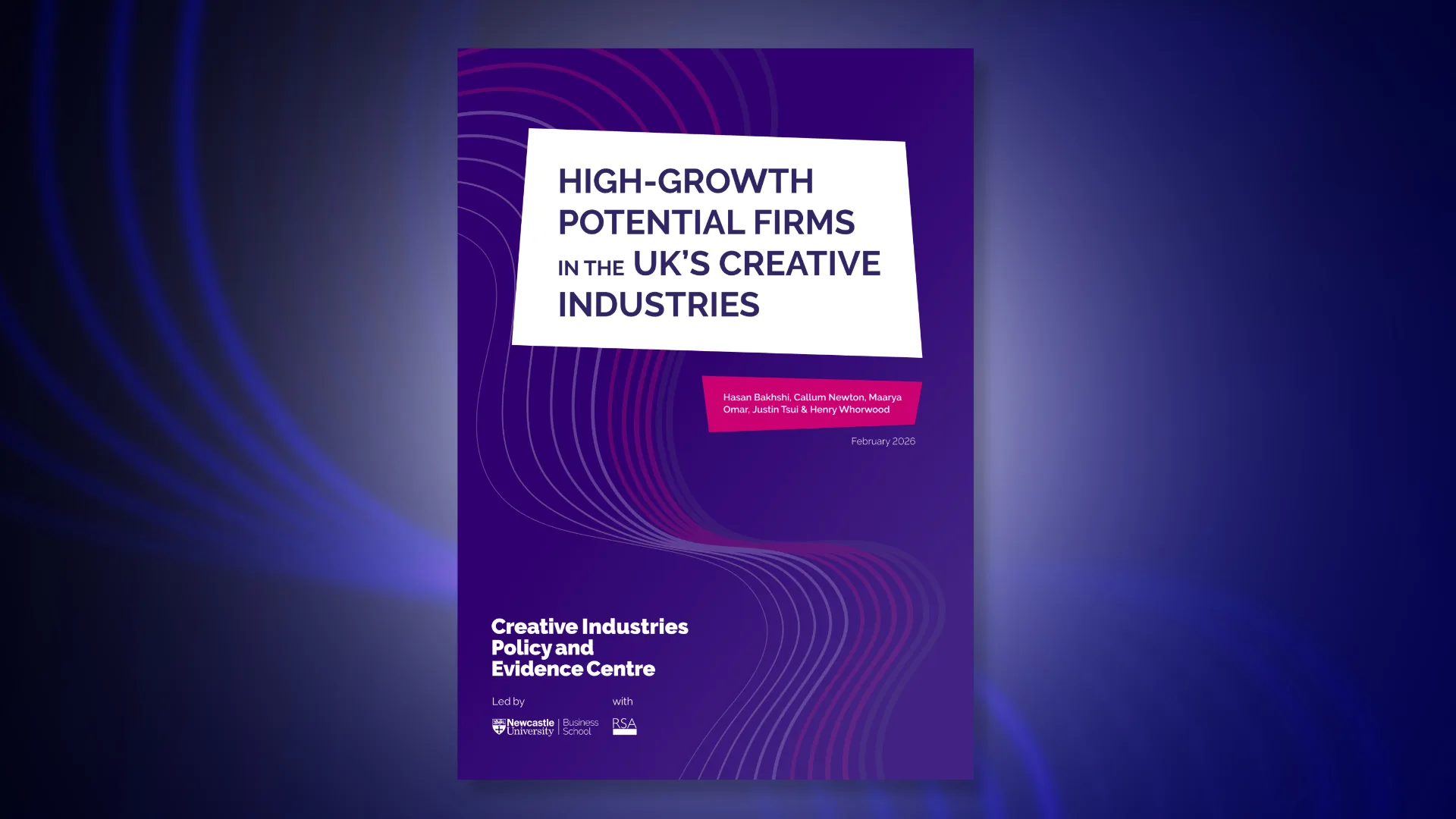A call to Government and Industry to adopt a 10-year, 10-point Social Mobility Plan
New report from the Creative Industries Policy and Evidence Centre shows the scale of class exclusion in the creative sector and calls on Government and Industry to adopt Social Mobility Plan
9th September 2021 – New research has found that if the UK’s Creative Industries were as socio economically diverse as the rest of the economy, there would be 250,000 more working-class people employed in the sector. This deficit is equivalent to the size of the creative workforce in Scotland, Wales and Northern Ireland combined.
The scale of the issue is highlighted by findings that class imbalances are more pronounced than in any other industrial sector, and that the relative likelihood of someone from a working-class background landing a creative role has remained largely unchanged since 2014. The research further shows that creative roles, such as Architects, Journalists and Editors, Musicians, Artists, and Producers and Directors, are among the most elite in the economy, more so even than Management Consultants or Stockbrokers.
The research was carried out by the Creative Industries Policy and Evidence Centre (PEC), supported by funding from the Department of Digital, Culture, Media and Sport (DCMS). It included a nine month-inquiry with over 150 interviews with stakeholders, businesses and those with lived-experience of class-based exclusion in the Creative Sector.
The findings serve as a ‘call to action’ to Industry and Government to focus on socio-economic diversity in the Creative Industries, as part of wider efforts to ‘Level Up’ the UK economy.
Researchers set out a ten-year, ten-point Social Mobility Plan to tackle structural inequalities and deliver systemic change. Priorities and actions identified range from early-life interventions through to employer practices in the workplace and call for change from Government, educators and leaders of creative businesses. Read the summary of key findings and the full report: Social mobility in the creative economy: rebuilding and levelling up
Our brilliant fashion, publishing and advertising sectors are an economic powerhouse and will play a vital role as we build back better from the pandemic. The Government has taken steps to improve representation in the sector, including through the groundbreaking ScreenSkills Apprenticeship pilot, to ensure we are levelling up across the UK. We will study the findings of this report to help bring about meaningful, positive change in this area.
Culture Minister Caroline Dinenage
As we rebuild following the Covid-19 pandemic, it is vital that we widen access to opportunities created in high-growth, high-skill parts of the UK economy, like the Creative Industries. Our research provides definitive evidence on the causes of class imbalances and sets out an ambitious and wide-ranging programme of change to enhance social mobility into the Creative Economy. Government and Industry must seize this moment, as we emerge from an unprecedented crisis, to address the long-standing inequalities in the Creative sector and to grasp the potential offered by diverse talent in the UK to cement our creative excellence and competitive advantage, globally.
Heather Carey, from the Creative Industries Policy and Evidence Centre and Work Advance
Our new report is definitive – there is a clear class crisis across our cultural and creative industries. If the research ends debate over whether there is class discrimination in cultural jobs, the question of how to address that crisis is still open. The report offers a 10 point, 10 year, plan for a total transformation of class and social mobility in the creative economy. It is up to policymakers, organisations, institutions, and individuals, to rise to the challenge and make good on their commitments to change.
Dave O’Brien from the Creative Industries Policy and Evidence Centre and the University of Edinburgh
Press contact
Anna Zabow, Communications Manager of the PEC. 07713 619077 / anna.zabow@nesta.org.uk
Notes to Editors
- The research is part of a three-year programme, led by the Creative Industries Policy and Evidence Centre (PEC), working in partnership with the Social Mobility Commission and Creative Industries Federation, exploring Class in the Creative Industries. The second phase of the work, supported by funding from DCMS, draws on new data from the Labour Force Survey and wider evidence on the impact of Covid-19 on social mobility into creative roles. Researchers also undertook more than 150 interviews with industry stakeholders, businesses and workers with lived experience of class-based disadvantage in the creative sector, focussing on four creative sectors: Advertising, Fashion, Publishing, and Screen.
- The PEC authors of the report, Heather Carey (Director, Work Advance) and Dave O’Brien (Chancellor’s Fellow, University of Edinburgh) are available for interview.
About the Creative Industries Policy and Evidence Centre (PEC)
The Creative Industries Policy and Evidence Centre (PEC) works to support the growth of the UK’s Creative Industries through the production of independent and authoritative evidence and policy advice. Led by Nesta and funded by the Arts and Humanities Research Council as part of the UK Government’s Industrial Strategy, the Centre comprises of a consortium of universities from across the UK (Birmingham; Cardiff; Edinburgh; Glasgow; Work Foundation at Lancaster University; LSE; Manchester; Newcastle; Sussex; Ulster). The PEC works with a diverse range of industry partners including the Creative Industries Federation. To find out more, visit www.pec.ac.uk and @CreativePEC
Image by Jr Korpa
Related News and Press
Creative Industries present huge investment opportunity
New research shows ‘high-growth potential firms’ outnumber both Life Sciences and Advanced Manufactu…
Bolster business and financial support for creative industries micro firms to achieve UK innovation and growth ambitions
New Creative PEC research suggests creative industries micro firms have a vital role to play in driv…
Back the creative industries to grow the economy, says new research showing creative firms are more likely to be innovators and exporters
New research finds a higher share of UK creative MSMEs are exporters compared with the rest of the e…



